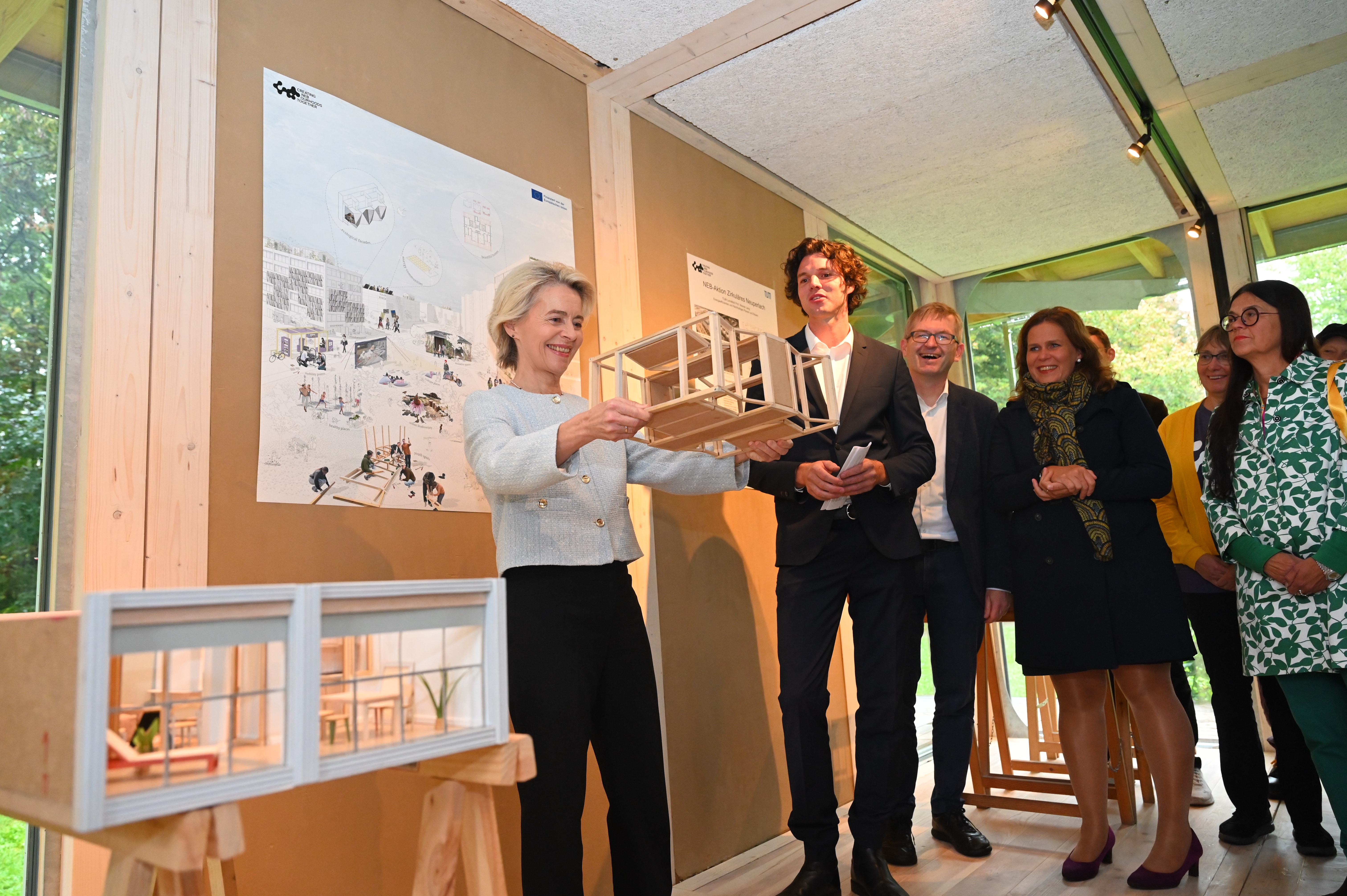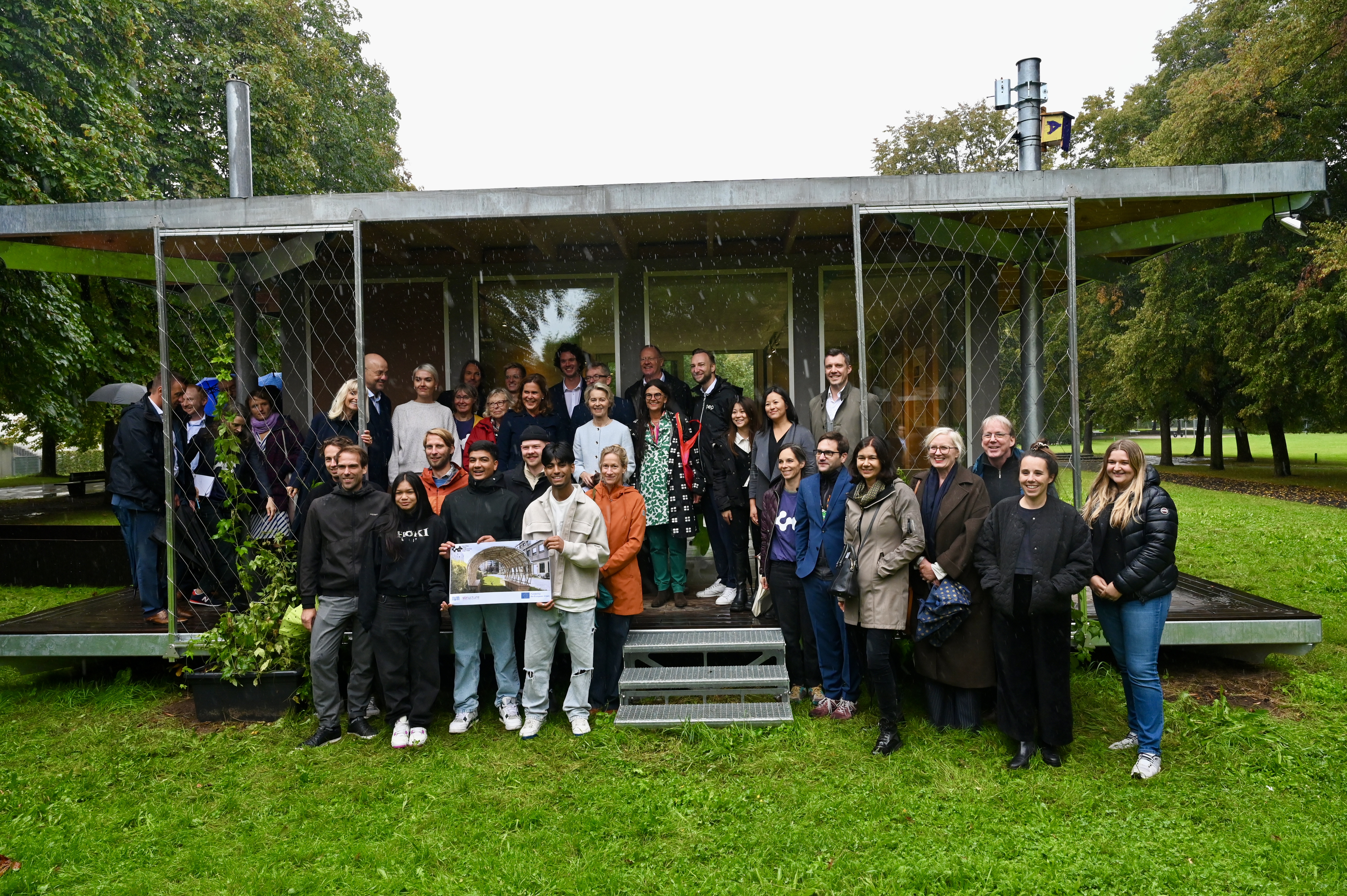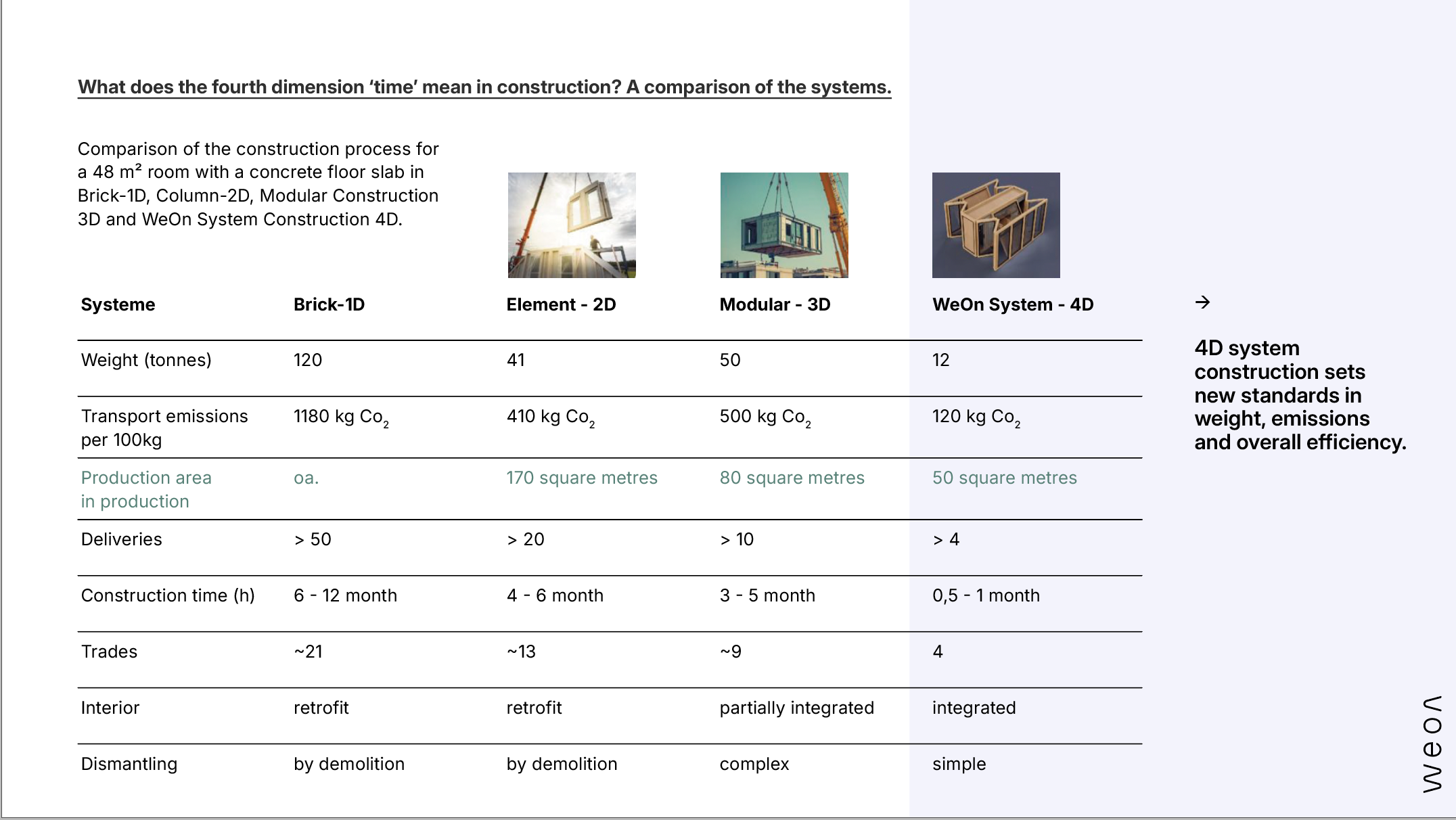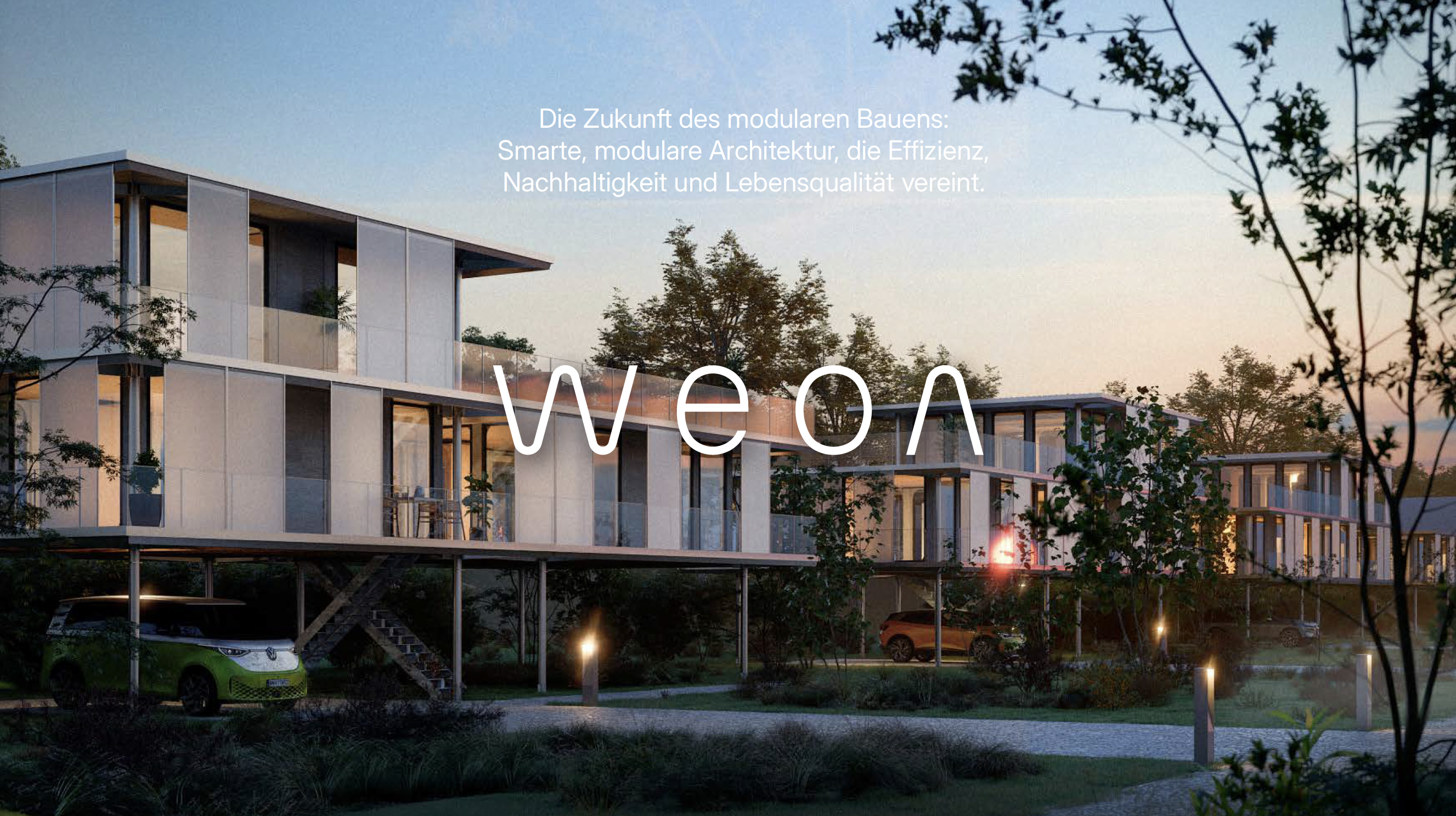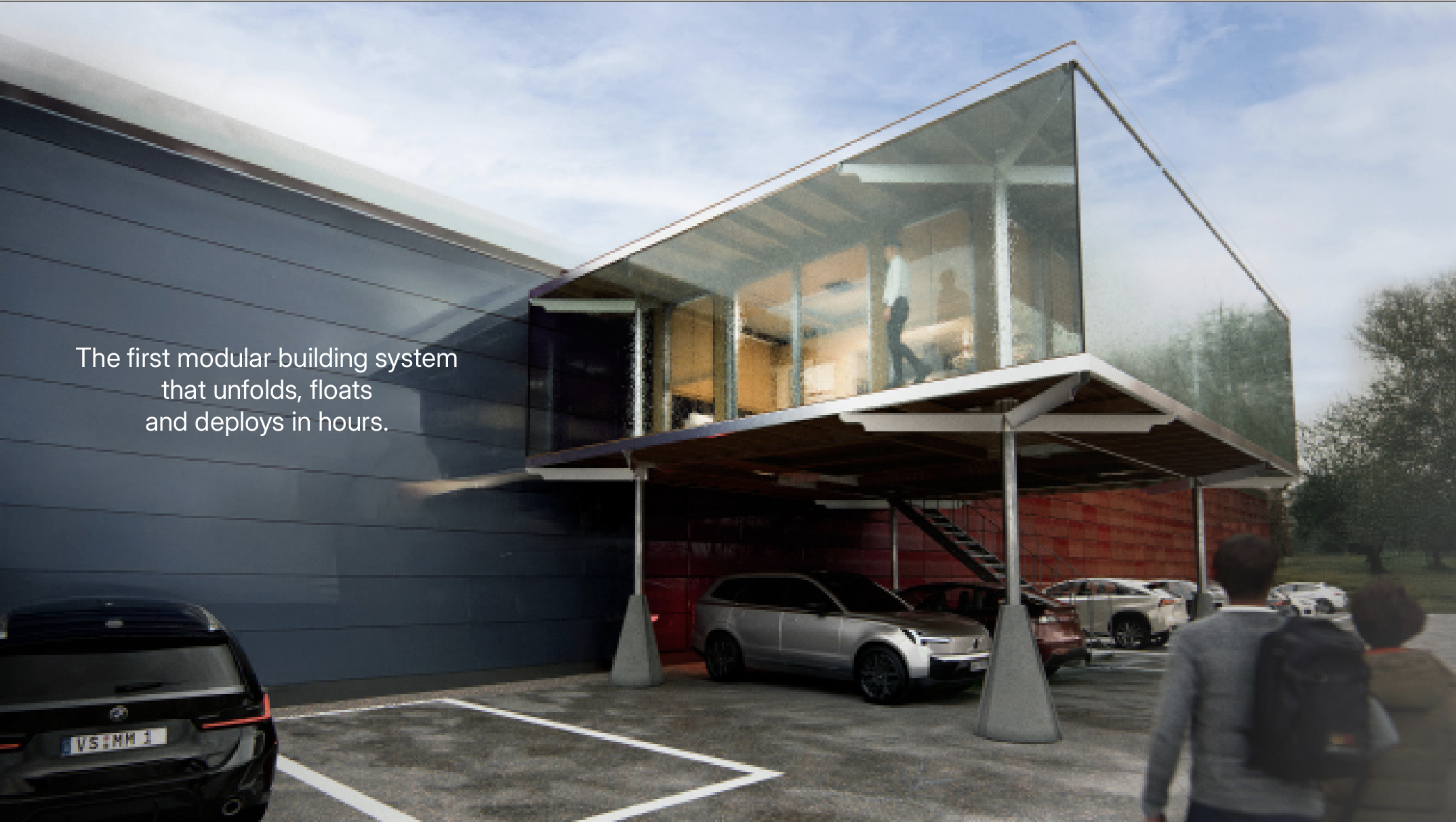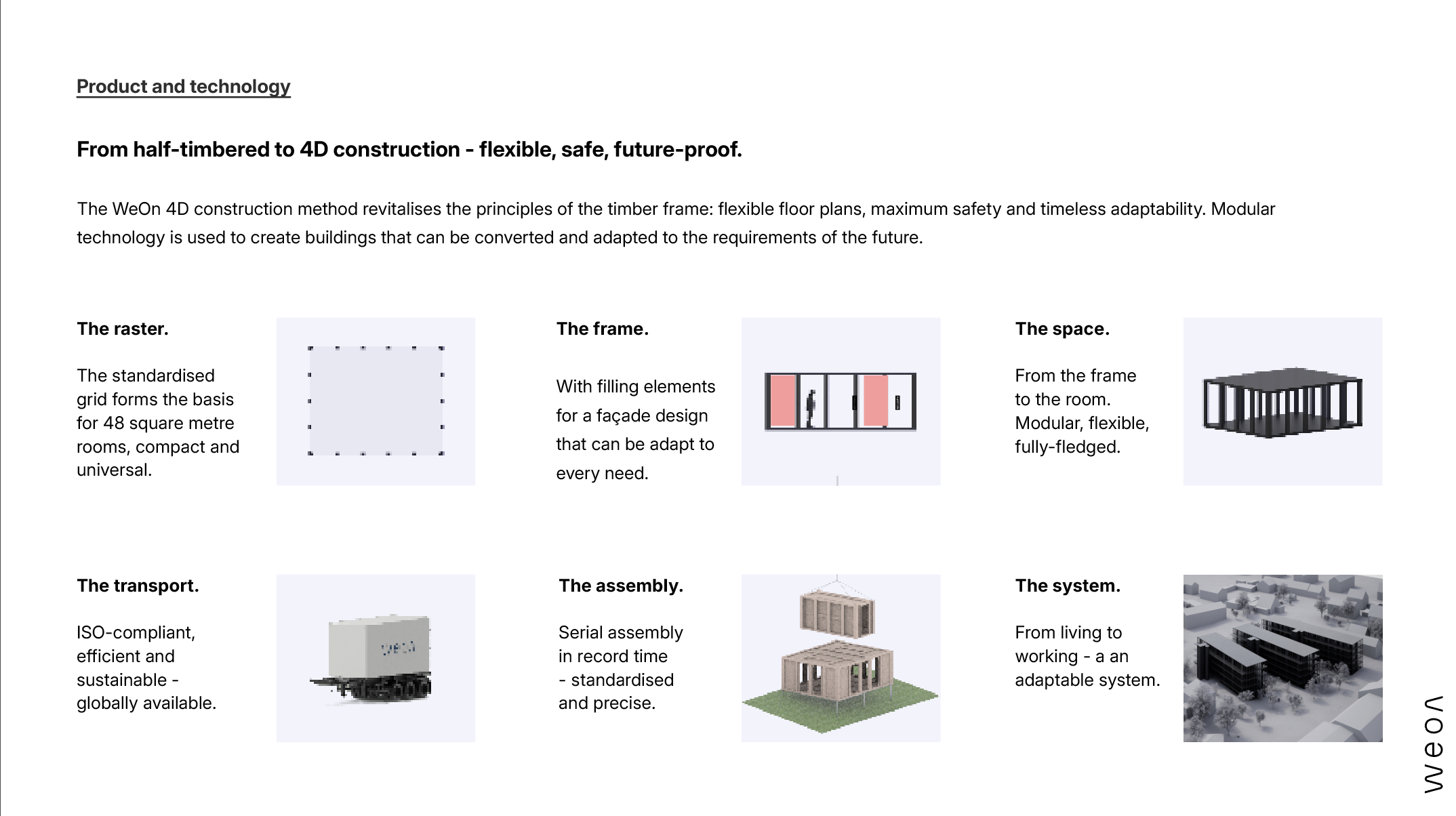Shaping a circular industrial ecosystem and supporting life-cycle thinking
WeOn – Modular Sustainable Living
WeOn: A Universal, Scalable, and Sustainable Modular Housing Solution
WeOn revolutionizes urban living with modular, foldable housing that is sustainable, rapidly deployable, and cost-effective. Inspired by the efficiency of the automotive industry, our prefabricated structures minimize on-site construction time, reducing costs and environmental impact. With flexible configurations and high aesthetic standards, WeOn provides affordable and adaptable housing solutions for a more sustainable future.
Germany
National
Mainly urban
It refers to a physical transformation of the built environment (hard investment)
Yes
2023-12-01
No
No
Yes
Yes
Yes
As an individual
WeOn is a groundbreaking modular building system designed to revolutionize sustainable urban development. By integrating prefabrication, foldability, and high energy efficiency, WeOn enables rapid, cost-effective, and environmentally friendly construction. Our system minimizes on-site construction time, reducing logistical complexity, emissions, and labor costs. Inspired by principles from the automotive industry, WeOn follows a Build-to-Stock (BTS) and Build-to-Order (BTO) model, ensuring scalability while allowing for customization.
Overall Aim & Innovation:
WeOn’s goal is to provide flexible, high-quality living spaces that meet the urgent demands of urbanization, affordability, and climate resilience. Unlike traditional modular solutions, WeOn’s foldable architecture significantly reduces transportation volume, cutting logistical costs and CO₂ emissions by up to 80%. The system is designed for circularity, using renewable materials and enabling easy disassembly, reuse, and relocation, contributing to a sustainable and adaptive built environment.
Target Groups:
Municipalities & Public Institutions: Addressing affordable housing shortages, temporary shelters, and emergency accommodations.
Project Developers & Real Estate Investors: Scalable, cost-efficient solutions for large-scale residential projects.
Companies & Industries: Providing high-quality worker accommodations, campus housing, and co-living spaces.
Specific Objectives:
Fast & Efficient Deployment: WeOn modules can be installed in less than a week, reducing delays common in conventional construction.
Sustainability & Circular Economy: Use of engineered timber, passive house standards, and modular flexibility for long-term use and relocation.
Aesthetic & Functional Design: Blending contemporary architecture with high-quality interiors and seamless integration into urban environments.
Achieved Outcomes & Recognition:
WeOn's first prototype was realized and recognized by VDL.
Overall Aim & Innovation:
WeOn’s goal is to provide flexible, high-quality living spaces that meet the urgent demands of urbanization, affordability, and climate resilience. Unlike traditional modular solutions, WeOn’s foldable architecture significantly reduces transportation volume, cutting logistical costs and CO₂ emissions by up to 80%. The system is designed for circularity, using renewable materials and enabling easy disassembly, reuse, and relocation, contributing to a sustainable and adaptive built environment.
Target Groups:
Municipalities & Public Institutions: Addressing affordable housing shortages, temporary shelters, and emergency accommodations.
Project Developers & Real Estate Investors: Scalable, cost-efficient solutions for large-scale residential projects.
Companies & Industries: Providing high-quality worker accommodations, campus housing, and co-living spaces.
Specific Objectives:
Fast & Efficient Deployment: WeOn modules can be installed in less than a week, reducing delays common in conventional construction.
Sustainability & Circular Economy: Use of engineered timber, passive house standards, and modular flexibility for long-term use and relocation.
Aesthetic & Functional Design: Blending contemporary architecture with high-quality interiors and seamless integration into urban environments.
Achieved Outcomes & Recognition:
WeOn's first prototype was realized and recognized by VDL.
Modular Housing
Sustainability
Circular Economy
Rapid Deployment
Urban Transformation
Sustainability
WeOn integrates sustainability at every stage of the building lifecycle. The modular system is designed for circularity, using engineered timber from certified sources, minimizing CO₂ emissions and resource consumption. Unlike traditional construction, WeOn reduces material waste through precision prefabrication and can be disassembled, relocated, or repurposed, extending the lifecycle of each unit.
The foldable architecture allows up to 80% reduction in transport volume, cutting emissions and costs while enabling CO₂-neutral rail transport. The modules adhere to Passive House Standards, achieving high energy efficiency through superior insulation, airtightness, and integrated renewable energy solutions like photovoltaic panels and green roofs.
Inclusion
WeOn provides high-quality, affordable, and accessible housing solutions, addressing the pressing need for flexible living spaces in urban areas. The system enables socially inclusive housing, from worker accommodations and student housing to refugee shelters and senior living. By drastically reducing construction time and costs, WeOn makes sustainable living accessible to a broader demographic, bridging the affordability gap.
The industrialized production model ensures consistent quality while allowing local customization, preserving cultural identity and adaptability to diverse social needs. The flexible modular design supports multi-generational and community-based living, fostering stronger local networks.
Aesthetics
WeOn prioritizes design excellence in modular construction. The system follows modernist architectural principles, emphasizing light-filled, well-ventilated spaces with high indoor air quality. Using natural materials and contemporary aesthetics, WeOn enhances urban environments rather than compromising them.
Our prototype, visited by VDL, showcases a balance of sustainability, functionality, and beauty, serving as a blueprint for future urban transformation.
WeOn integrates sustainability at every stage of the building lifecycle. The modular system is designed for circularity, using engineered timber from certified sources, minimizing CO₂ emissions and resource consumption. Unlike traditional construction, WeOn reduces material waste through precision prefabrication and can be disassembled, relocated, or repurposed, extending the lifecycle of each unit.
The foldable architecture allows up to 80% reduction in transport volume, cutting emissions and costs while enabling CO₂-neutral rail transport. The modules adhere to Passive House Standards, achieving high energy efficiency through superior insulation, airtightness, and integrated renewable energy solutions like photovoltaic panels and green roofs.
Inclusion
WeOn provides high-quality, affordable, and accessible housing solutions, addressing the pressing need for flexible living spaces in urban areas. The system enables socially inclusive housing, from worker accommodations and student housing to refugee shelters and senior living. By drastically reducing construction time and costs, WeOn makes sustainable living accessible to a broader demographic, bridging the affordability gap.
The industrialized production model ensures consistent quality while allowing local customization, preserving cultural identity and adaptability to diverse social needs. The flexible modular design supports multi-generational and community-based living, fostering stronger local networks.
Aesthetics
WeOn prioritizes design excellence in modular construction. The system follows modernist architectural principles, emphasizing light-filled, well-ventilated spaces with high indoor air quality. Using natural materials and contemporary aesthetics, WeOn enhances urban environments rather than compromising them.
Our prototype, visited by VDL, showcases a balance of sustainability, functionality, and beauty, serving as a blueprint for future urban transformation.
Aesthetics and Quality of Experience
WeOn redefines modular architecture by seamlessly integrating aesthetics, functionality, and sustainability. Our design approach prioritizes natural materials, light-filled spaces, and modernist simplicity, creating an elevated living experience that challenges perceptions of prefabricated housing. By combining high design standards with industrial production methods, WeOn offers an affordable yet architecturally refined solution to urban housing.
Human-Centered Design
WeOn modules enhance well-being through optimal spatial proportions, high indoor air quality, and large windows that maximize daylight. The interiors balance warm wooden surfaces with minimalist, functional design, ensuring a sense of tranquility and quality.
Drawing inspiration from Japanese and Scandinavian architecture, WeOn emphasizes harmony, modular flexibility, and timeless elegance, creating cozy yet contemporary living spaces adaptable to various cultural and climatic conditions.
Urban Integration & Cultural Relevance
WeOn’s architecture blends with its environment, whether in urban, rural, or natural settings. The façades are customizable, allowing integration into local architectural identities while maintaining a modern and elegant aesthetic. Green roofs, wooden paneling, and modular extensions make each unit visually appealing while respecting the surrounding fabric.
Exemplary Impact
The first WeOn pavilion, visited by Ursula von der Leyen, has demonstrated its aesthetic and cultural value in the New European Bauhaus initiative.
By focusing on design-driven modularity, WeOn proves that prefabrication does not mean compromise—it means innovation.
The system offers a scalable yet customizable approach to sustainable urban transformation, creating spaces people love to live in.
WeOn redefines modular architecture by seamlessly integrating aesthetics, functionality, and sustainability. Our design approach prioritizes natural materials, light-filled spaces, and modernist simplicity, creating an elevated living experience that challenges perceptions of prefabricated housing. By combining high design standards with industrial production methods, WeOn offers an affordable yet architecturally refined solution to urban housing.
Human-Centered Design
WeOn modules enhance well-being through optimal spatial proportions, high indoor air quality, and large windows that maximize daylight. The interiors balance warm wooden surfaces with minimalist, functional design, ensuring a sense of tranquility and quality.
Drawing inspiration from Japanese and Scandinavian architecture, WeOn emphasizes harmony, modular flexibility, and timeless elegance, creating cozy yet contemporary living spaces adaptable to various cultural and climatic conditions.
Urban Integration & Cultural Relevance
WeOn’s architecture blends with its environment, whether in urban, rural, or natural settings. The façades are customizable, allowing integration into local architectural identities while maintaining a modern and elegant aesthetic. Green roofs, wooden paneling, and modular extensions make each unit visually appealing while respecting the surrounding fabric.
Exemplary Impact
The first WeOn pavilion, visited by Ursula von der Leyen, has demonstrated its aesthetic and cultural value in the New European Bauhaus initiative.
By focusing on design-driven modularity, WeOn proves that prefabrication does not mean compromise—it means innovation.
The system offers a scalable yet customizable approach to sustainable urban transformation, creating spaces people love to live in.
Inclusion: Accessibility, Affordability & New Societal Models
WeOn is designed to make high-quality housing accessible and affordable for a wide range of social groups, addressing urban housing shortages and rising costs. By leveraging industrialized production and modular construction, WeOn reduces building expenses and enables faster deployment, making it an economically viable solution for municipalities, social housing projects, and private developers.
Affordability & Accessibility
WeOn’s prefabricated, foldable system lowers material, labor, and transport costs, allowing housing to be built at lower prices than traditional methods.
The modular approach ensures scalability, making it suitable for social housing, student housing, worker accommodations, refugee shelters, and senior living.
The fast on-site assembly (under one week) reduces disruption in urban environments, making WeOn an efficient solution for urgent housing needs.
Design for All
WeOn applies universal design principles, ensuring barrier-free access for people with disabilities and multi-generational living.
Interior spaces enhance quality of life, providing good indoor air quality, natural lighting, and adaptable layouts.
The modular system allows for custom configurations, adapting to diverse user needs while maintaining cost efficiency.
New Societal Models & Community Building
WeOn promotes co-living concepts, enabling shared spaces that foster social interaction and community building.
The system supports urban densification without land consumption, using rail corridors, underutilized spaces, and elevated structures, creating new urban typologies.
By integrating renewable energy, green roofs, and circular economy principles, WeOn contributes to sustainable urban development.
Exemplary Impact
The first WeOn prototype, visited by VDL has demonstrated its potential as an inclusive, scalable housing model.
WeOn proves that affordability, sustainability, and design quality can
WeOn is designed to make high-quality housing accessible and affordable for a wide range of social groups, addressing urban housing shortages and rising costs. By leveraging industrialized production and modular construction, WeOn reduces building expenses and enables faster deployment, making it an economically viable solution for municipalities, social housing projects, and private developers.
Affordability & Accessibility
WeOn’s prefabricated, foldable system lowers material, labor, and transport costs, allowing housing to be built at lower prices than traditional methods.
The modular approach ensures scalability, making it suitable for social housing, student housing, worker accommodations, refugee shelters, and senior living.
The fast on-site assembly (under one week) reduces disruption in urban environments, making WeOn an efficient solution for urgent housing needs.
Design for All
WeOn applies universal design principles, ensuring barrier-free access for people with disabilities and multi-generational living.
Interior spaces enhance quality of life, providing good indoor air quality, natural lighting, and adaptable layouts.
The modular system allows for custom configurations, adapting to diverse user needs while maintaining cost efficiency.
New Societal Models & Community Building
WeOn promotes co-living concepts, enabling shared spaces that foster social interaction and community building.
The system supports urban densification without land consumption, using rail corridors, underutilized spaces, and elevated structures, creating new urban typologies.
By integrating renewable energy, green roofs, and circular economy principles, WeOn contributes to sustainable urban development.
Exemplary Impact
The first WeOn prototype, visited by VDL has demonstrated its potential as an inclusive, scalable housing model.
WeOn proves that affordability, sustainability, and design quality can
Participatory Approach & Civil Society Engagement
WeOn follows the three working principles of the New European Bauhaus—participation, multi-level engagement, and transdisciplinarity—by actively involving citizens, governments, and experts in developing modular, sustainable housing.
Community-Driven Participation
WeOn engages citizens, local organizations, and urban planners in co-designing spaces that reflect local needs. The participatory model ensures that housing solutions are co-created with communities, fostering social acceptance, trust, and integration.
During the first WeOn prototype, community discussions and feedback rounds helped adapt the modular system to urban challenges. These consultations influenced key design choices, such as barrier-free access, flexible layouts, and shared spaces, improving social dynamics.
Multi-Level Engagement & Collaboration
WeOn collaborates with municipalities, investors, architects, and researchers to create a scalable housing model. Our engagement spans policy-makers, industry partners, and academia for validation and policy alignment.
Recognized by Ursula von der Leyen, WeOn contributes to sustainable urban housing. This support shows how bottom-up participation aligns with policymaking, creating a synergistic framework for transformation.
Transdisciplinary Approach & Impact
WeOn integrates experts from construction, urban planning, and circular economy to develop an adaptive, inclusive housing solution.
Impact of Civil Society Involvement:
Ensured housing meets real-world needs, not a one-size-fits-all model.
Strengthened public-private partnerships, enabling faster implementation.
Proved that citizen-driven design improves urban livability and acceptance.
WeOn shows that participatory, inclusive design builds resilient cities and is a replicable model for affordable, sustainable, and community-integrated housing.
WeOn follows the three working principles of the New European Bauhaus—participation, multi-level engagement, and transdisciplinarity—by actively involving citizens, governments, and experts in developing modular, sustainable housing.
Community-Driven Participation
WeOn engages citizens, local organizations, and urban planners in co-designing spaces that reflect local needs. The participatory model ensures that housing solutions are co-created with communities, fostering social acceptance, trust, and integration.
During the first WeOn prototype, community discussions and feedback rounds helped adapt the modular system to urban challenges. These consultations influenced key design choices, such as barrier-free access, flexible layouts, and shared spaces, improving social dynamics.
Multi-Level Engagement & Collaboration
WeOn collaborates with municipalities, investors, architects, and researchers to create a scalable housing model. Our engagement spans policy-makers, industry partners, and academia for validation and policy alignment.
Recognized by Ursula von der Leyen, WeOn contributes to sustainable urban housing. This support shows how bottom-up participation aligns with policymaking, creating a synergistic framework for transformation.
Transdisciplinary Approach & Impact
WeOn integrates experts from construction, urban planning, and circular economy to develop an adaptive, inclusive housing solution.
Impact of Civil Society Involvement:
Ensured housing meets real-world needs, not a one-size-fits-all model.
Strengthened public-private partnerships, enabling faster implementation.
Proved that citizen-driven design improves urban livability and acceptance.
WeOn shows that participatory, inclusive design builds resilient cities and is a replicable model for affordable, sustainable, and community-integrated housing.
Multi-Level Stakeholder Engagement
WeOn integrates stakeholders at local, regional, national, and European levels, ensuring broad support and impact. Each level contributes specific expertise, resources, and regulatory frameworks that shape the success of the project.
Local Engagement
Municipalities & Urban Planners: Cities and local governments collaborate to identify suitable sites for WeOn modules, streamline permit processes, and ensure integration into existing urban infrastructure.
Community Organizations: Feedback from citizens and advocacy groups influences design decisions, ensuring social acceptance and adaptability to local needs.
Regional & National Engagement
Industry & Developers: Collaboration with construction firms and real estate developers has helped refine WeOn’s industrialized production model, ensuring scalability and cost efficiency.
Research & Academia: Universities and technical institutes contribute through testing, validation, and innovation, supporting WeOn’s development with expertise in sustainability, material science, and architecture.
European-Level Engagement
New European Bauhaus & Policy Makers: WeOn aligns with the New European Bauhaus principles, fostering dialogue with EU institutions to shape future policy frameworks for modular, sustainable housing.
Recognition by Ursula von der Leyen underscores WeOn’s potential as a scalable model for sustainable urban transformation across Europe.
International Collaboration: WeOn explores partnerships beyond national borders, leveraging European funding programs to accelerate deployment and replication.
Impact & Added Value
By involving multi-level stakeholders, WeOn benefits from regulatory support, financial stability, and technological advancements, making it a pioneering force in sustainable housing solutions.
WeOn integrates stakeholders at local, regional, national, and European levels, ensuring broad support and impact. Each level contributes specific expertise, resources, and regulatory frameworks that shape the success of the project.
Local Engagement
Municipalities & Urban Planners: Cities and local governments collaborate to identify suitable sites for WeOn modules, streamline permit processes, and ensure integration into existing urban infrastructure.
Community Organizations: Feedback from citizens and advocacy groups influences design decisions, ensuring social acceptance and adaptability to local needs.
Regional & National Engagement
Industry & Developers: Collaboration with construction firms and real estate developers has helped refine WeOn’s industrialized production model, ensuring scalability and cost efficiency.
Research & Academia: Universities and technical institutes contribute through testing, validation, and innovation, supporting WeOn’s development with expertise in sustainability, material science, and architecture.
European-Level Engagement
New European Bauhaus & Policy Makers: WeOn aligns with the New European Bauhaus principles, fostering dialogue with EU institutions to shape future policy frameworks for modular, sustainable housing.
Recognition by Ursula von der Leyen underscores WeOn’s potential as a scalable model for sustainable urban transformation across Europe.
International Collaboration: WeOn explores partnerships beyond national borders, leveraging European funding programs to accelerate deployment and replication.
Impact & Added Value
By involving multi-level stakeholders, WeOn benefits from regulatory support, financial stability, and technological advancements, making it a pioneering force in sustainable housing solutions.
Interdisciplinary Collaboration & Knowledge Exchange
WeOn integrates a broad range of disciplines to create a scalable, sustainable, and aesthetically appealing modular housing solution. The interdisciplinary approach fosters innovation and ensures diverse expertise contributes to success.
Key Disciplines Involved
Architecture & Urban Planning: Space-efficient modular designs adapted to urban densification.
Engineering & Construction: Foldable, prefabricated structures with high energy efficiency and minimal on-site work.
Material Science & Sustainability: Use of renewable materials (engineered timber), lifecycle analysis, and circular economy principles.
Industrial Design & Manufacturing: Automotive-inspired production models enhance efficiency, scalability, and cost-effectiveness.
Social Sciences & Community Engagement: Involvement of citizens, policymakers, and organizations to ensure user-centric design.
Interaction & Added Value
Cross-Sector Collaboration: Experts worked together to balance aesthetics, efficiency, and affordability.
Innovative Problem-Solving: Engineers and designers optimized foldable structures, architects ensured adaptability, and sustainability experts minimized environmental impact.
Policy & Market Integration: Engagement with municipalities, research institutions, and private partners ensured compliance and feasibility.
Recognition & Influence: The prototype, visited by Ursula von der Leyen, showcases WeOn as a transdisciplinary innovation in modular housing.
By merging architecture, sustainability, engineering, and social engagement, WeOn demonstrates how interdisciplinary collaboration creates impactful, scalable urban solutions.
WeOn integrates a broad range of disciplines to create a scalable, sustainable, and aesthetically appealing modular housing solution. The interdisciplinary approach fosters innovation and ensures diverse expertise contributes to success.
Key Disciplines Involved
Architecture & Urban Planning: Space-efficient modular designs adapted to urban densification.
Engineering & Construction: Foldable, prefabricated structures with high energy efficiency and minimal on-site work.
Material Science & Sustainability: Use of renewable materials (engineered timber), lifecycle analysis, and circular economy principles.
Industrial Design & Manufacturing: Automotive-inspired production models enhance efficiency, scalability, and cost-effectiveness.
Social Sciences & Community Engagement: Involvement of citizens, policymakers, and organizations to ensure user-centric design.
Interaction & Added Value
Cross-Sector Collaboration: Experts worked together to balance aesthetics, efficiency, and affordability.
Innovative Problem-Solving: Engineers and designers optimized foldable structures, architects ensured adaptability, and sustainability experts minimized environmental impact.
Policy & Market Integration: Engagement with municipalities, research institutions, and private partners ensured compliance and feasibility.
Recognition & Influence: The prototype, visited by Ursula von der Leyen, showcases WeOn as a transdisciplinary innovation in modular housing.
By merging architecture, sustainability, engineering, and social engagement, WeOn demonstrates how interdisciplinary collaboration creates impactful, scalable urban solutions.
Innovative Dimension Compared to Mainstream Practices
WeOn revolutionizes modular construction by combining foldability, industrialized efficiency, and sustainability, offering a scalable, affordable, and environmentally friendly alternative to conventional building methods.
Key Innovations vs. Mainstream Construction
Foldable Architecture
Unlike traditional prefabricated modules, WeOn’s foldable design enables 80% volume reduction during transport, lowering logistics costs and CO₂ emissions.
Conventional methods rely on oversized transports, increasing costs and site constraints.
Automotive-Inspired Production
WeOn applies Build-to-Stock (BTS) and Build-to-Order (BTO) principles, ensuring mass customization at industrial speed.
Mainstream practices often suffer from long lead times, high costs, and fragmented supply chains.
Fully Integrated Systems
WeOn modules arrive with pre-installed technical equipment (electrical, plumbing, HVAC), reducing on-site assembly to under a week.
Standard approaches require multiple trades, increasing delays, labor dependency, and risks.
Circular Economy & Sustainability
WeOn modules use engineered timber, passive house standards, and green roofs, supporting climate-positive urban development.
Conventional construction relies on CO₂-intensive materials, with high resource waste.
Scalable Urban Densification
WeOn enables housing above roads, railway corridors, and underutilized urban spaces, tackling land scarcity and urban sprawl.
Standard developments require new land consumption, often leading to environmental degradation.
Impact & Scalability
WeOn demonstrates a paradigm shift by merging sustainability, speed, and affordability in one solution. Recognized by Ursula von der Leyen, WeOn is setting new benchmarks for urban, climate-resilient, and modular housing across Europe.
WeOn revolutionizes modular construction by combining foldability, industrialized efficiency, and sustainability, offering a scalable, affordable, and environmentally friendly alternative to conventional building methods.
Key Innovations vs. Mainstream Construction
Foldable Architecture
Unlike traditional prefabricated modules, WeOn’s foldable design enables 80% volume reduction during transport, lowering logistics costs and CO₂ emissions.
Conventional methods rely on oversized transports, increasing costs and site constraints.
Automotive-Inspired Production
WeOn applies Build-to-Stock (BTS) and Build-to-Order (BTO) principles, ensuring mass customization at industrial speed.
Mainstream practices often suffer from long lead times, high costs, and fragmented supply chains.
Fully Integrated Systems
WeOn modules arrive with pre-installed technical equipment (electrical, plumbing, HVAC), reducing on-site assembly to under a week.
Standard approaches require multiple trades, increasing delays, labor dependency, and risks.
Circular Economy & Sustainability
WeOn modules use engineered timber, passive house standards, and green roofs, supporting climate-positive urban development.
Conventional construction relies on CO₂-intensive materials, with high resource waste.
Scalable Urban Densification
WeOn enables housing above roads, railway corridors, and underutilized urban spaces, tackling land scarcity and urban sprawl.
Standard developments require new land consumption, often leading to environmental degradation.
Impact & Scalability
WeOn demonstrates a paradigm shift by merging sustainability, speed, and affordability in one solution. Recognized by Ursula von der Leyen, WeOn is setting new benchmarks for urban, climate-resilient, and modular housing across Europe.
Methodology & Approach
WeOn follows a holistic, interdisciplinary, and industrialized approach to modular housing, integrating design, engineering, and sustainability to deliver an affordable, scalable, and high-quality solution.
Key Methodological Pillars
Automotive-Inspired Industrialization
WeOn applies Build-to-Stock (BTS) and Build-to-Order (BTO) principles, ensuring mass customization with efficient serial production.
Unlike conventional construction, this method reduces material waste, delays, and costs while maintaining high design flexibility.
Foldable & Prefabricated Modular System
The foldable ISO-container format reduces transport costs by up to 80%, making large-scale deployment feasible.
Full pre-integration of technical systems (HVAC, plumbing, electrical) ensures plug-and-play installation on-site within days.
Sustainability & Circular Economy
Use of engineered timber, passive house principles, and low-carbon materials to minimize environmental impact.
Modular design-for-disassembly enables relocation, reuse, and adaptability over a building’s lifecycle.
Urban Integration & Land Efficiency
WeOn enables housing over roads, railways, and underutilized urban spaces, addressing land scarcity and densification challenges.
The flexible modular approach allows adaptive reconfiguration for different uses (student housing, social housing, worker accommodations).
User-Centric & Participatory Design
Engagement with municipalities, policymakers, and communities ensures solutions meet real-world housing needs.
Prototyping & testing phases validated by architectural and engineering experts enhance performance and scalability.
Impact & Scalability
WeOn’s methodology streamlines housing production, accelerates urban transformation, and sets new industry standards for sustainable modular housing.
WeOn follows a holistic, interdisciplinary, and industrialized approach to modular housing, integrating design, engineering, and sustainability to deliver an affordable, scalable, and high-quality solution.
Key Methodological Pillars
Automotive-Inspired Industrialization
WeOn applies Build-to-Stock (BTS) and Build-to-Order (BTO) principles, ensuring mass customization with efficient serial production.
Unlike conventional construction, this method reduces material waste, delays, and costs while maintaining high design flexibility.
Foldable & Prefabricated Modular System
The foldable ISO-container format reduces transport costs by up to 80%, making large-scale deployment feasible.
Full pre-integration of technical systems (HVAC, plumbing, electrical) ensures plug-and-play installation on-site within days.
Sustainability & Circular Economy
Use of engineered timber, passive house principles, and low-carbon materials to minimize environmental impact.
Modular design-for-disassembly enables relocation, reuse, and adaptability over a building’s lifecycle.
Urban Integration & Land Efficiency
WeOn enables housing over roads, railways, and underutilized urban spaces, addressing land scarcity and densification challenges.
The flexible modular approach allows adaptive reconfiguration for different uses (student housing, social housing, worker accommodations).
User-Centric & Participatory Design
Engagement with municipalities, policymakers, and communities ensures solutions meet real-world housing needs.
Prototyping & testing phases validated by architectural and engineering experts enhance performance and scalability.
Impact & Scalability
WeOn’s methodology streamlines housing production, accelerates urban transformation, and sets new industry standards for sustainable modular housing.
High Potential for Transferability & Replicability
WeOn’s scalable, modular housing system is designed for easy replication across different regions, climates, and socio-economic contexts. By integrating industrialized production, foldable architecture, and sustainable materials, WeOn offers a globally adaptable solution for efficient urban housing.
Key Transferable Elements
Modular & Foldable Construction
The standardized yet adaptable design allows deployment in diverse settings, from urban densification to emergency housing.
The ISO-container format ensures seamless transport, reducing costs and enabling global distribution.
Industrialized Production
Build-to-Stock & Build-to-Order methodologies enable mass production with customization, making WeOn suitable for various markets.
Factories worldwide can replicate the process, ensuring quality while reducing costs.
Sustainability & Circular Economy
Engineered timber, passive house standards, and circular design allow WeOn to meet strict environmental regulations.
The modular system is disassemblable and reusable, extending its lifecycle and reducing waste.
Urban Adaptability
WeOn can be implemented above roads, railways, or on underutilized land, ideal for cities facing land scarcity.
The system’s scalable density supports both high-density urban and low-rise suburban expansion.
Policy & Market Adaptation
WeOn’s flexible approach allows adaptation to local building codes, cultural preferences, and climates.
The model fits public-private partnerships, social housing, and private real estate projects.
Impact & Scalability
WeOn proves that sustainable housing can be industrialized and replicated globally. By leveraging its efficiency, adaptability, and transportability, WeOn sets a new standard for future-ready housing.
WeOn’s scalable, modular housing system is designed for easy replication across different regions, climates, and socio-economic contexts. By integrating industrialized production, foldable architecture, and sustainable materials, WeOn offers a globally adaptable solution for efficient urban housing.
Key Transferable Elements
Modular & Foldable Construction
The standardized yet adaptable design allows deployment in diverse settings, from urban densification to emergency housing.
The ISO-container format ensures seamless transport, reducing costs and enabling global distribution.
Industrialized Production
Build-to-Stock & Build-to-Order methodologies enable mass production with customization, making WeOn suitable for various markets.
Factories worldwide can replicate the process, ensuring quality while reducing costs.
Sustainability & Circular Economy
Engineered timber, passive house standards, and circular design allow WeOn to meet strict environmental regulations.
The modular system is disassemblable and reusable, extending its lifecycle and reducing waste.
Urban Adaptability
WeOn can be implemented above roads, railways, or on underutilized land, ideal for cities facing land scarcity.
The system’s scalable density supports both high-density urban and low-rise suburban expansion.
Policy & Market Adaptation
WeOn’s flexible approach allows adaptation to local building codes, cultural preferences, and climates.
The model fits public-private partnerships, social housing, and private real estate projects.
Impact & Scalability
WeOn proves that sustainable housing can be industrialized and replicated globally. By leveraging its efficiency, adaptability, and transportability, WeOn sets a new standard for future-ready housing.
Addressing Global Challenges with Local Solutions
WeOn tackles critical global challenges such as urbanization, housing shortages, climate change, and resource efficiency by offering scalable, modular, and sustainable housing solutions tailored to local needs.
Key Global Challenges & Local Solutions
Housing Crisis & Urbanization
Rising urban populations create severe housing shortages and affordability crises.
WeOn’s prefabricated, modular system enables rapid, cost-effective deployment, reducing construction time and costs while maintaining high-quality living standards.
Land Scarcity & Urban Densification
Many cities struggle with limited land availability, forcing urban sprawl.
WeOn builds over roads, railways, and underutilized spaces, maximizing land efficiency without increasing urban footprints.
Climate Change & CO₂ Reduction
Traditional construction is responsible for over 30% of global CO₂ emissions.
WeOn uses engineered timber, passive house standards, and energy-efficient designs, significantly reducing carbon footprints.
Disaster-Resilient & Emergency Housing
Natural disasters and conflicts create urgent housing needs for displaced populations.
WeOn’s fast-assembly system can provide immediate, high-quality housing in crisis situations.
Circular Economy & Resource Efficiency
Construction waste accounts for one-third of global landfill waste.
WeOn’s modular, disassemblable design enables reusability, relocatability, and waste reduction, promoting a circular economy.
Scalability & Local Adaptation
WeOn’s flexible housing model adapts to various climates, local policies, and socio-economic conditions, making it a globally replicable yet locally adaptable solution for sustainable urban development.
WeOn tackles critical global challenges such as urbanization, housing shortages, climate change, and resource efficiency by offering scalable, modular, and sustainable housing solutions tailored to local needs.
Key Global Challenges & Local Solutions
Housing Crisis & Urbanization
Rising urban populations create severe housing shortages and affordability crises.
WeOn’s prefabricated, modular system enables rapid, cost-effective deployment, reducing construction time and costs while maintaining high-quality living standards.
Land Scarcity & Urban Densification
Many cities struggle with limited land availability, forcing urban sprawl.
WeOn builds over roads, railways, and underutilized spaces, maximizing land efficiency without increasing urban footprints.
Climate Change & CO₂ Reduction
Traditional construction is responsible for over 30% of global CO₂ emissions.
WeOn uses engineered timber, passive house standards, and energy-efficient designs, significantly reducing carbon footprints.
Disaster-Resilient & Emergency Housing
Natural disasters and conflicts create urgent housing needs for displaced populations.
WeOn’s fast-assembly system can provide immediate, high-quality housing in crisis situations.
Circular Economy & Resource Efficiency
Construction waste accounts for one-third of global landfill waste.
WeOn’s modular, disassemblable design enables reusability, relocatability, and waste reduction, promoting a circular economy.
Scalability & Local Adaptation
WeOn’s flexible housing model adapts to various climates, local policies, and socio-economic conditions, making it a globally replicable yet locally adaptable solution for sustainable urban development.
Key Achievements & Outputs
Successful Prototype Implementation
The first WeOn prototype was built and tested, demonstrating scalability, cost-effectiveness, and rapid deployment.
The project was recognized by Ursula von der Leyen, reinforcing its potential for broader European impact.
Time & Cost Efficiency
80% reduction in transport volume through foldable modules, cutting logistics costs and CO₂ emissions.
Prefabrication reduces on-site construction to under a week, minimizing labor costs and disruptions.
Sustainability & Circular Economy
Use of engineered timber, passive house standards, and green roofs ensures low environmental footprint.
Modular and reusable system extends the lifecycle and supports a circular economy.
Social & Economic Impact
WeOn offers affordable, high-quality housing for diverse groups, from students to workers and social housing residents.
The design enhances urban spaces by utilizing underused areas like roads and railways.
Scalability & Replication Potential
WeOn’s automotive-inspired production model allows mass customization for different markets.
The system is adaptable to local regulations, climates, and socio-economic needs, making it globally replicable.
Long-Term Vision
WeOn proves that sustainable, fast, and high-quality housing is achievable. Its scalability and efficiency set new standards for climate-friendly urban development.
Successful Prototype Implementation
The first WeOn prototype was built and tested, demonstrating scalability, cost-effectiveness, and rapid deployment.
The project was recognized by Ursula von der Leyen, reinforcing its potential for broader European impact.
Time & Cost Efficiency
80% reduction in transport volume through foldable modules, cutting logistics costs and CO₂ emissions.
Prefabrication reduces on-site construction to under a week, minimizing labor costs and disruptions.
Sustainability & Circular Economy
Use of engineered timber, passive house standards, and green roofs ensures low environmental footprint.
Modular and reusable system extends the lifecycle and supports a circular economy.
Social & Economic Impact
WeOn offers affordable, high-quality housing for diverse groups, from students to workers and social housing residents.
The design enhances urban spaces by utilizing underused areas like roads and railways.
Scalability & Replication Potential
WeOn’s automotive-inspired production model allows mass customization for different markets.
The system is adaptable to local regulations, climates, and socio-economic needs, making it globally replicable.
Long-Term Vision
WeOn proves that sustainable, fast, and high-quality housing is achievable. Its scalability and efficiency set new standards for climate-friendly urban development.

